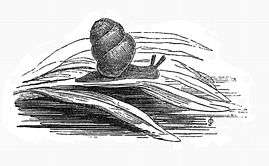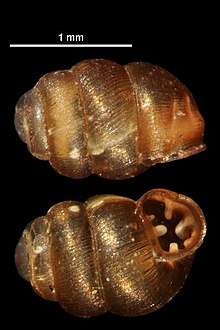Vertigo substriata
Vertigo substriata is a species of minute air-breathing land snail, a terrestrial pulmonate gastropod mollusk or micromollusk in the family Vertiginidae, the whorl snails.

| Vertigo substriata | |
|---|---|
 | |
| shell of Vertigo substriata (specimen at MNHN, Paris) | |
NE[1] | |
| Scientific classification | |
| Kingdom: | |
| Phylum: | |
| Class: | |
| Superfamily: | |
| Family: | |
| Subfamily: | Vertigininae |
| Tribe: | Vertiginini |
| Genus: | Vertigo |
| Subgenus: | Vertigo |
| Species: | V. substriata |
| Binomial name | |
| Vertigo substriata | |
| Synonyms | |
| |
Distribution
The type locality is the Barnstaple district, of Devonshire, England. "Under stones, among dead and decaying leaves and at the roots of grass in woods and moist places."[3]
This species occurs in countries and islands including:
Shell description

The shell is oval or subfusiform, rather thin, and semitransparent, glossy, pale yellowish-horn-color, very strongly and obliquely striate and almost ribbed in the line of growth, but less so on the body whorl, which is faintly striate spirally, periphery is rounded. The epidermis is rather thick. The shell has 4 whorls, which are very convex or cylindrical, and suddenly increasing in bulk. The penultimate whorl is slightly exceeding in breadth the last, which occupies about one-half of the shell. Spire is short, very abrupt and bluntly pointed. Suture is remarkably deep.[3]
Aperture is semioval, contracted or sinuous in the middle of the outer edge; teeth from four to six, viz. from one to three (usually two) on the pillar (on parietal wall), one on the pillar lip, and two or three on the inside of the outer lip, the last springing from a white rib; in half grown specimens the pillar lip has a spiral or longitudinal fold. Outer lip thin and slightly reflected, externally strengthened by a strong rib, which is placed very near the opening the mouth; outer edge abruptly inflected, inner lip thickened in the adult. Umbilicus is small and narrow, contracted by a keel or ridge at the base of the shell.[3]
The width of the adult shell is about 0.04 inch, the height is 0.065 inch.[3]
References
This article incorporates public domain text from reference.[3]
- 2006 IUCN Red List of Threatened Species. <www.iucnredlist.org>. Cited 12 January 2008.
- Jeffreys J. G. 1833. A supplement to the "Synopsis of testaceous pneumonobranchous Mollusca of Great Britain". Transactions of the Linnean Society of London 16: 505-524.
- Pilsbry H. A. & Cooke C. M. 1918-1920. Manual of Conchology. Second series: Pulmonata. Volume 25. Pupillidae (Gastrocoptinae, Vertigininae). Philadelphia. page 172-173.
- Balashov I. & Gural-Sverlova N. 2012. An annotated checklist of the terrestrial molluscs of Ukraine. Journal of Conchology. 41 (1): 91-109.
External links
- Vertigo substriata at Animalbase taxonomy, short description, distribution, biology, status (threats), images